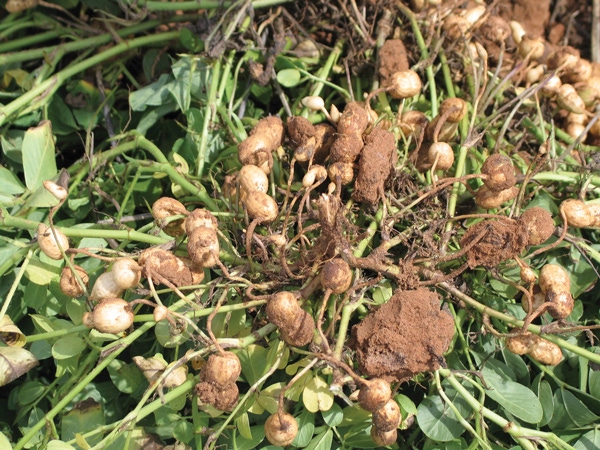February 28, 2011

Peanut producers should be aware there are significant legal issues whenever it comes to saving seed, and a violation of laws and regulations could prove costly.
“All peanut varieties that are currently grown in Georgia are, to my knowledge, protected by either the Plant Variety Protection Act (PVPA) of 1994 or a plant patent,” said Terry Hollifield of the Georgia Crop Improvement Association, speaking at the recent Georgia Peanut Farm Show in Albany.
There are several ways of going about getting a plant patent, he says. “The plant itself might be unique. In horticulture, that would include some of our turfgrass varieties. It can have a unique oil or mill chemistry. It can also have a unique gene, such as the Roundup Ready crops. Sometimes, you can have both a PVPA and a patent,” says Hollifield.
So what exactly is protected? Hollifield says the intellectual property rights of the developer are protected, and the developer isn’t necessarily the breeder.
“It can be the breeding institution such as the University of Georgia or the University of Florida, a private company, USDA. They own the intellectual property rights to that new invention. They have the ability to determine who can grow that seed and market it, and who has to pay a royalty for unique traits,” he says.
Varieties protected under the USDA-administrated PVPA may not be sold, marketed, offered for sale, delivered, consigned or exchanged without the explicit consent of the owner of the variety. “It is illegal to condition or shell the variety for the purpose of propagation. However, a producer may save seed for the sole purpose of planting his holdings, he says.
But there currently is some discrepancy over the term, “planting his holdings,” says Hollifield.
“What that meant to us in the past was that if you traditionally grew 100 acres of peanuts, and you purchased seed of a protected variety, and you wanted to save enough seed to re-plant that 100 acres, then you’re welcome to do so.
“That was within the law. But there has been some discussion over the last six to seven months that that is not the intent of the law — that what it really means is if you purchased 10,000 pounds of Georgia-06 seed last year, then you can save 10,000 pounds of Georgia-06 seed to plant this coming spring.”
Contact the developer
Hollifield suggests, particularly to custom shellers, that they might want to contact the developer of the cultivars to be certain about their interpretation of the law. “Remember that the developer is the institution that owns the patent, and not the breeder. Under the 1994 Act, it’s an infringement to shell, treat, bag or store farmer-saved seed at a quantity that exceeds what the farmer can legally save. We’ve got to get to a place to where we’re all in agreement as to what legally saved means.”
Custom shellers have a responsibility to uphold the PVPA, he says, and they have a responsibility to know the rules and regulations.
“If someone is caught violating the PVPA and they go to a jury trial before a judge, and they determine a loss to the owner of the intellectual property rights — loss of royalties or income — the judge can triple that number, and that’s how we get those large settlements, some of them here in Georgia.”
Obviously, says Hollifield, those fines are being used as a deterrent to prevent piracy of seed.
Patents, he explains, are a little more straight-forward. For anything protected by a patent, farmers may not save seed for that particular variety. Custom shellers may not shell, treat or bag seed of a patent-protected variety. Fines are similar to PVPA infringements, he adds.
Some growers have said they want to save their own seed because they feel they can grow a better product or have less costs in it, says Holliefied. “If it’s a protected variety, you’re welcomed to do so, but you need to be aware of what the law is so you don’t get into trouble.”
When you purchase your original seed, he advises, look on your bag and look on your tag. “Notification for PVPA has to be on the seed analysis tag. But the patent is not part of the Federal Seed Act, and that’ll usually show up on a separate tag, or it might be on the bag itself.”
As of January 2011, the following varieties were protected as “Patented,” meaning that a farmer may not save the seed: Andru II, ANorden, AT1-1, AT-215, AT201, AT-3085RO, Brantley, Flavor Runner 458, Florida Fancy, Florida-07, Georgia-02C, Georgia-04S, Georgia-05E, Georgia-08V, Georgia-09B, GA Hi OL, GK7-hi oleic, GP-1, Hull, McCloud, Olin, SunOleic 95R, SunOleic 97R, AgraTech VC-2 and York.
The following varieties are protected by the Plant Protection Act and a farmer may save enough seed to plant his acreage but not sell seed. Growers and shellers should check with the variety’s owner to be sure of the rules and regulations that apply to that specific variety or varieties: AP-3, AP-4, AT-3081R, Carver, CHAMPS, Coan, C-99R, DP-1, Georgia Green, Georgia Greener, Georgia-01R, Georgia-03L, Georgia-06G, Georgia-07W, Gregory, NC 12C, Perry, Phillips, Tifguard, ViruGard and Wilson.
Hollifield stresses that producers should contact the Georgia Crop Improvement Association if they are uncertain about the status of a variety. “A variety may be protected by both the Plant Variety Protection Act and a Patent.
To be safe, producers should contact the owner of the variety or the Georgia Crop Improvement Association at (706) 542-2351 or [email protected], http://www.certifiedseed.org, he says.
About the Author(s)
You May Also Like




